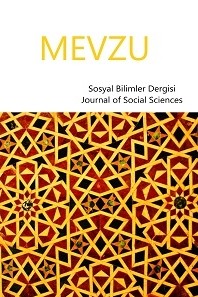Sokrates, Platon ve Aristoteles’in Atina Demokrasisine Eleştirileri
Atina, demokrasi, Sokrates, Platon, Aristoteles
Criticisms to Athenian Democracy by Socrates, Plato and Aristotle
___
- Aktan C. C., & Fettahoğlu Hallier, M. (2021). Antik Atina'da Demokrasi: Kurucular ve Temel Kurumlar. Gorgon Dergisi, 35, 5-27.
- Aristoteles. (2020). Politika. İstanbul: Say Yayınları.
- Childers, T. (1983). The Nazi voter: The social foundations of fascism in Germany, 1919-1933. North Carolina: Univ of North Carolina Press.
- Danziger, N. J. (2012). Understanding the Political World: A Comparative Introduction to Political Science. London: Pearson.
- Davies, J. K. (1993). Democracy and Classical Greece. Massachusetts: Harvard University Press:
- Gramsci, A. (1986). Hapishane Defterleri. İstanbul: Onur Yayınları.
- Heywood, A. (2018). Siyaset. İstanbul:BB101.
- Hüner, M. F. (2013). Antik Yunan Demokrasisi-Modern Demokrasi Karşılaştırması. Eleştirel Hukuk Dergisi, 13, 183- 203.
- Hornblower, S. (2011). The Greek World 479-323 BC. London: Routledge.
- Karagöz, K. (2010). Doğrudan Demokrasi Aracı Olarak Halk Girişimi. Ankara: Yekin Yayınları.
- Kriesi, H., & Wisler, D. (1996). Social movements and direct democracy in Switzerland. European Journal of Political Research, 30(1), 19-40. DOI: 10.1111/j.1475-6765.1996.tb00666.x
- Laclau, E., & MouffeE, C. (1985). Hegemony and Socialist Strategy: Towards a Radical Democratic Politics. London: Verso.
- Lyotard, J.F. (1984). The Postmodern Condition. Minneapolis: University of Minnesota Press.
- Marx, K. (2019). Karl Marx: Political Writings. London: Verso.
- Mazeaud, A., & Nonjon, M. (2017). The participatory democracy market in France: Between standardization and fragmentation. In Bherer, L., Gauthier, M., & Simard, L. (Eds.) The Professionalization of Public Participation, 40-64. London: Routledge:
- McClelland, J.S. (1996). A History of Western Political Thought. London: Routledge.
- Merriman, F. V. (1915). The Rise and Fall of the Platonic Kallipolis. Mind, 24(93), 1-15.
- Monoson, S. S. (2000). Plato's Democratic Entanglements. Princeton: Princeton University Press.
- Mosca, G. (1939). The Ruling Class. New York: McGraw-Hill.
- Norris, P. (2004). Electoral engineering: Voting Rules and Political Behavior. Cambridge: Cambridge University Press.
- Ober, J. (2015). The Rise and Fall of Classical Greece. Princeton: Princeton University Press.
- Pareto, V. (1968). The Rise and Fall of the Elites. New Jersey: The Bedminster.
- Platon. (2000). Devlet. İstanbul: Sosyal Yayınlar.
- Platon. (2005). Sokrates'in Savunması. İstanbul: Bordo Siyah.
- Raaflaub, K. (2004). The Discovery of Freedom in Ancient Greece: Revised and Updated Edition. Chicago: University of Chicago Press.
- Rousseau, J. J. (2014). Toplum Sözleşmesi. Ankara: Tutku Yayınevi.
- Russell, B. (2012). Batı Felsefesi Tarihi Cilt I. İstanbul: Alfa Yayınları.
- Sharrock, A., & Ashley, R. (2013). Fifty key classical authors. London: Routledge.
- Şaylan, G. (2002). Postmodernizm. Ankara: İmge.
- Tridimas, G. (2012). Constitutional choice in ancient Athens: the rationality of selection to office by lot. Constitutional Political Economy, 23(1), 1-21.
- Urbinati, N. (2006). Representative democracy: principles and genealogy. Chicago: University of Chicago Press.
- Thorley, J. (2012). Athenian democracy. London: Routledge.
- Yıldırım, M. (2009). Modernizm, postmodernizm ve kamu yönetimi. Uluslararası İnsan Bilimleri Dergisi 6(2), 380- 397.
- Zafirovski, M. (2010). The Enlightenment and its Effects on Modern Society. Cham: Springer.
- Yayın Aralığı: Yılda 2 Sayı
- Başlangıç: 2019
- Yayıncı: Ali SEVER
EMT Çevirmen Yeterliklerinin Piyasada İstenen Kriterlerle Karşılaştırılması: Türkiye Örneği
Müzik Alanındaki Uzaktan Eğitim Çalışmalarına Yönelik Genel Bir Literatür Değerlendirmesi
Cemâleddîn Mehmet el-Münşî’nin “Nezîlü’t-Tenzîl” İsimli Tefsirinde Kelime ve Kavram Tahlil Metodu
Evsizlerin Genel Özellikleri, Sokaktaki Yaşam Deneyimleri ve İhtiyaçları
Güngör ÇABUK, Elvan ATAMTÜRK, Selma ÖNCEL
Bir Zahiri İki Kıyas: İbn Hazm’ın Mantıki Kıyas Müdafaası ve Fıkhi Kıyas Karşıtlığı
Osmanlıda Haberleşme Sistemi Çerçevesinde “Diyarbakır Menzilleri”
Metaverse Çağında Öğretmenlik Mesleğinin Geleceğini Düşünmek
Protest Bir Tavır Olarak Recep İvedik Tiplemesi
Hadis İlmi Açısından et-Teftâzânî’nin Şerhu'l-Akâid İsimli Eseri
